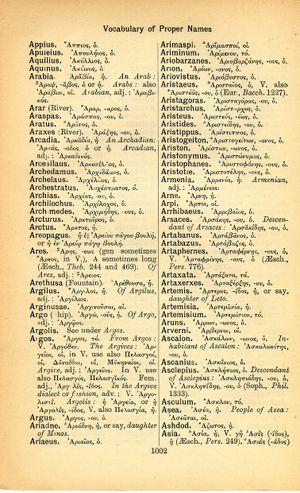Asia: Difference between revisions
Γάμει δὲ μὴ τὴν προῖκα, τὴν γυναῖκα δέ → Uxorem cape, non dotem, in matrimonium → Nimm bei der Heirat nicht die Mitgift, nimm die Frau
(D_1) |
(Gf-D_1) |
||
| Line 1: | Line 1: | ||
{{WoodhouseENELnames | {{WoodhouseENELnames | ||
|Text=[[File:woodhouse_1002.jpg|thumb|link= | |Text=[[File:woodhouse_1002.jpg|thumb | ||
|link={{filepath:woodhouse_1002.jpg}}]][[Ἀσία]], ἡ, V. γῆ Ἀσίς (-ίδος), ἡ (Aesch., ''Pers.'' 249). Ἀσιάς (-άδος) [[χθών]], ἡ (Eur., ''Ion'', 74), Ἀσιάς γῆ, ἡ (Eur., ''Ion'', 1586), or Ἀσιάς, ἡ, alone (Eur., ''Ion'', 1356), or Ἀσιᾶτις (-ιδος) γῆ, ἡ (Eur., <b class="b2">And. 1</b>). | |||
<b class="b2">The continent of Asia</b>: [[ἤπειρος]] [[Ἀσίς]], ἡ (Aesch., <b class="b2">P.</b> V. 735). | <b class="b2">The continent of Asia</b>: [[ἤπειρος]] [[Ἀσίς]], ἡ (Aesch., <b class="b2">P.</b> V. 735). | ||
Revision as of 07:27, 14 August 2017
English > Greek (Woodhouse)
Ἀσία, ἡ, V. γῆ Ἀσίς (-ίδος), ἡ (Aesch., Pers. 249). Ἀσιάς (-άδος) χθών, ἡ (Eur., Ion, 74), Ἀσιάς γῆ, ἡ (Eur., Ion, 1586), or Ἀσιάς, ἡ, alone (Eur., Ion, 1356), or Ἀσιᾶτις (-ιδος) γῆ, ἡ (Eur., And. 1).
The continent of Asia: ἤπειρος Ἀσίς, ἡ (Aesch., P. V. 735).
Asiatic, adj.: Ἀσιανός. Fem. adj., V. Ἀσιάς (-άδος), Ἀσιᾶτις (-ιδος) (Eur., Tro. 1219; El. 315), Ἠπειρῶτις (-ιδος) (Eur., And. 159).
The people of Asia: οἱ Ἀσιανοί.
Latin > English (Lewis & Short)
Ā̆sĭa: ae, f. (in regard to the quantity of the A, cf. Jahn ad Ov. M. 5, 648), = Ἀσία.
Orig., a town in Lydia; afterwards the region around it; hence,
B Adj.: Ā̆sĭus, a, um, of Asia: palus, the marshy region on the river Cayster, Verg. A. 7, 701; cf. id. G. 1, 383, and Hom. Il. 2, 461; Asia, a nymph, Verg. G. 4, 343; cf. Hyg. Fab. prooem.—
In an extended signif., Asia Minor, Cic. Imp. Pomp. 6; Hor. Ep. 1, 3, 5; Verg. A. 2, 557; Sen. Troad. 6; Vulg. Act. 19, 26; 21, 27 al.—Hence also for Pergamos, Liv. 26, 24; Vell. 2, 4; and, as a Roman province, or Proconsular Asia, κατ' ἐξοχήν (ἡ ἰδίως καλουμένη Ἀδία, Strabo, 17, p. 118), Asia comprehended Mysia, Lydia, Caria, and Phrygia; cf.: Namque, ut opinor, Asia vestra constat ex Phrygiā, Cariā, Mysiā, Lydiā, Cic. Fl. 27; id. Imp. Pomp. 6; Vulg. Act. 2, 9; 6, 9; ib. 1 Cor. 16, 19 et saep.— Hence,
B Ā̆sĭus, a, um, adj., Asiatic (cf. Asiaticus): villa, Varr. ap. Non. p. 466, 3.— For Troas, Ov. M. 13, 484.—
III In a still wider sense, the whole of the quarter of the globe Asia (hence the distinction Asia Minor, Oros. 1, 2), Plin. 5, 9, 9, § 47 sqq.—A poet. form, Ā̆sis, īdis, Asia, Ov. M. 5, 648; 9, 448. ††
2 asĭa, ae, f.; among the Taurini, rye, in pure Lat., secale, Plin. 18, 16, 40, § 141.
Latin > French (Gaffiot 2016)
(2) Asĭa,⁷ æ, f., Asie
1 [partie du monde] Sall. J. 17, 3, [ou Asia major, par opp. à Asia minor ] Just. 15, 4, 1
2 [Asie antérieure, Asie mineure] : Cic. Br. 51 ; Liv. 38, 39, 15 Asia minor Oros. 1, 2 ]
3 [royaume de Pergame]: Liv. 26, 24, 9
4 [province romaine d’Asie] : Cic. Fl. 65 ; Pomp. 14 ; Plin. 5, 102.

